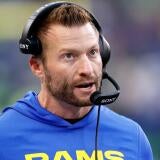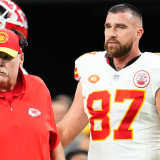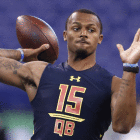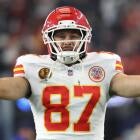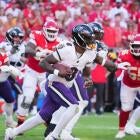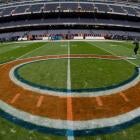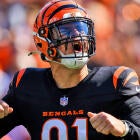2017 NFL Mock Draft: Chargers finally find a franchise QB to replace Philip Rivers
The Chargers have more pressing holes to fill, but look to the future with the seventh pick

In the NFL, a team is only going as far as its quarterback will take it. It’s a big reason why the Browns have been mired in awfulness, and why others -- like, say, the Packers -- transitioned seamlessly from Hall of Famer Brett Favre to future Hall of Famer Aaron Rodgers.
Yes, the draft is as much art as science, and sometimes a healthy dose of luck can go a long way. You might have heard something about Tom Brady lasting until the sixth round; 17 years later, he’s still playing. And the Chargers are hoping preparation and opportunity help them find their own luck in our latest mock draft. We have San Diego selecting Clemson quarterback Deshaun Watson with the No. 7 pick. And even though 35-year-old Philip Rivers has shown no signs of slowing just yet, that’s all the more reason to find his successor; Watson can spend the next season or two on the bench -- which is how Rivers began his NFL career -- and take over the offense when Rivers calls it a career.
1. Cleveland Browns
Myles Garrett, DE, Texas A&M: There isn’t a quarterback worthy of the No. 1 pick, so instead of forcing the issue, the Browns take the freakishly athletic Garrett, who would immediately upgrade Cleveland’s pass rush, which ranked 21st last season.

2. San Francisco 49ers
Solomon Thomas, DE, Stanford: Yes, there is a glaring hole at quarterback but the 49ers’ defense was god-awful last season, ranking 28th against the pass and 31st against the run. Solomon is a low-risk pick because of A) His upside; and B) He’s not a quarterback who would arrive in San Francisco with unreasonable expectations.

3. Chicago Bears
Jamal Adams, S, LSU: Silver lining to being terrible on both sides of the ball: It’s hard to go wrong with whoever you select. And Adams, who might be the safest pick in the draft, can play in the box or deep centerfield.

4. Jacksonville Jaguars
Jonathan Allen, DL, Alabama: Allen was unblockable at times at Alabama and had 28.5 sacks as a three-year starter. He would join a defense that drafted Jalen Ramsey and Myles Jack last season and Dante Fowler in 2015.

5. Tennessee Titans (from Los Angeles)
Marshon Lattimore, CB, Ohio State: The Titans would’ve loved Adams, but they’ll settle for Lattimore, who wouldn’t take long to find his way into the starting lineup and bolster a pass defense that ranked 26th last season. Lattimore, who has a history of hamstring injuries, suffered a hip flexor injury at the combine, which could raise concerns about his durability. That said, it’s hard to overlook his athleticism.

6. New York Jets
Malik Hooker, S, Ohio State: Darrelle Revis is gone and even with the addition of Morris Claiborne, the Jets’ secondary remains an enormous question mark. Hooker is one of the best players in the draft and he’ll immediately upgrade a suspect unit.

7. Los Angeles Chargers
Deshaun Watson, QB, Clemson: Philip Rivers has shown no signs of slowing but he’s 35 and (presumably) has no plans to play forever. At the combine in February, general manager Tom Telesco didn’t rule out drafting a quarterback and in Watson the Chargers would get a player who would benefit from a season or two on the bench while he grew into the position. If it sounds familiar it should; Rivers, a first-round pick back in 2004, sat behind Drew Brees for two years before finally graduating to the starting job.
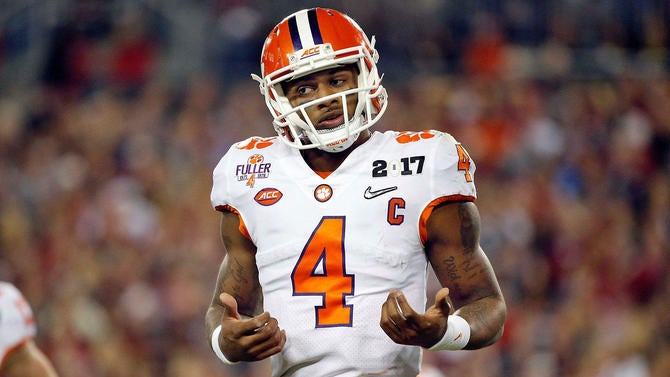
8. Carolina Panthers
Leonard Fournette, RB, LSU: The Panthers could certainly stand to bolster the offensive line, but the thought of a backfield of Cam Newton and Fournette is an intriguing one, even after Fournette had a so-so combine.

9. Cincinnati Bengals
Corey Davis, WR, Western Michigan: The Bengals drafted Tyler Boyd last year, but it wasn’t enough to overcome the loss of Mohamed Sanu and Marvin Jones, who had great 2016 seasons in Atlanta and Detroit. Davis (6-feet-3, 209 pounds) would immediately improve a passing offense that already includes A.J. Green, Tyler Eifert and Boyd.

10. Buffalo Bills
Mike Williams, WR, Clemson: The temptation is to take a quarterback, but the Bills will no doubt be wary after the whole EJ Manuel debacle. Instead, Buffalo adds another wildly talented skill-position player in Williams, who will join Sammy Watkins and LeSean McCoy to bolster an offense that finished 10th in 2016.

11. New Orleans Saints
Derek Barnett, DE, Tennessee: Here’s all you need to know: 30th, 32nd, 31st -- that’s where the Saints’ defense has finished the past three years. So it stands to reason that they would add a defensive playmaker early in the draft. Barnett has been stout against the run since he arrived on campus and his 34 career sacks show that he evolved during his three years with the Vols.

12. Cleveland Browns (from Philadelphia)
Mitchell Trubisky, QB, North Carolina: The Browns need a franchise quarterback. Those six words have been true pretty much since the team returned to Cleveland in 1999. Trubisky is an Ohio native who many evaluators consider the best quarterback in the draft. At 6-2, the former Tar Heel is short by prototypical NFL QB standards, and he has just one year as a starter in college, which is a concern for some scouts.
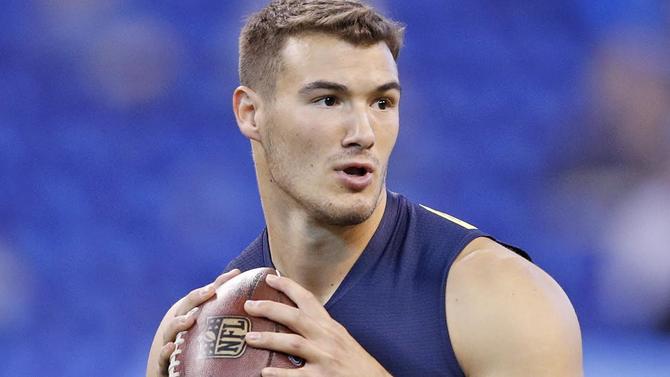
13. Arizona Cardinals
DeShone Kizer, QB, Notre Dame: Just like the Chargers and Rivers, the Cardinals could address life in a post-Carson Palmer world a year or two before it actually happens. And like Watson, Kizer could use a season on the bench to grow into the position.
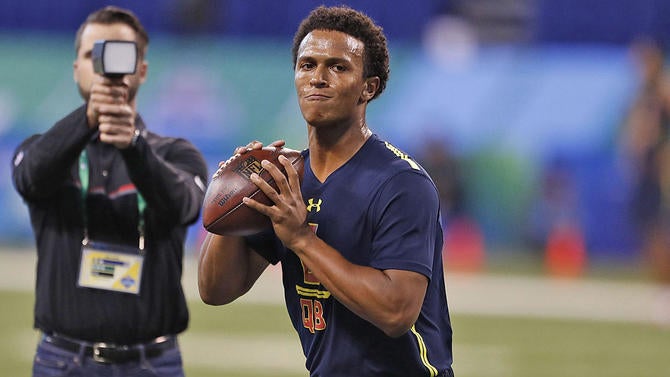
14. Philadelphia Eagles (from Minnesota)
Gareon Conley, CB, Ohio State: Played in the same secondary with Marshon Lattimore and Malik Hooper and started every game the past two seasons, replacing another first-rounder, Eli Apple, who was drafted by the Giants in 2015. At 6-0, 195 pounds, Conley has been compared to Aqib Talib, which would make him a valuable asset for the Eagles in the rough-and-tumble NFC East.
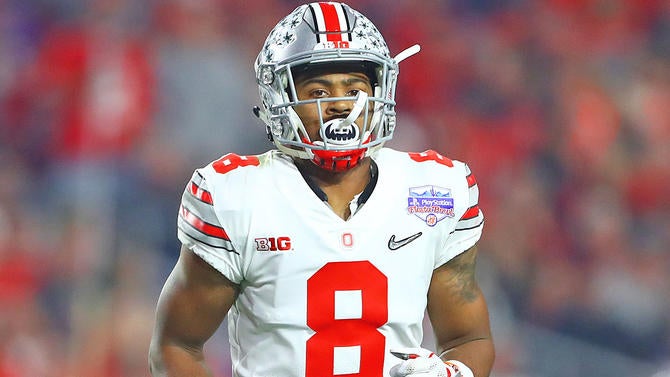
15. Indianapolis Colts
Reuben Foster, LB, Alabama: The Colts added pass rushers John Simon and Jabaal Sheard in free agency, and now they get a game-changing inside linebacker that plays with an edge. Foster is a top-10 talent and the Colts can overlook what Foster describes as a “misunderstanding” that led to his early dismissal at the combine.
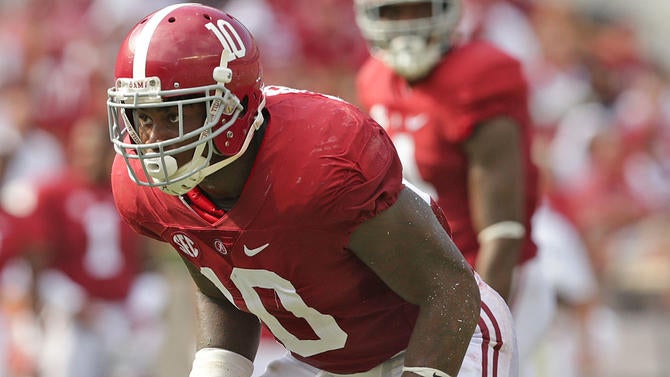
16. Baltimore Ravens
O.J. Howard, TE, Alabama: Former second-round pick Maxx Williams missed all but four games with a knee injury in 2016, and go-to tight end has been a big part of Joe Flacco’s success. Howard has a chance to be a dominant downfield presence, which should make losing Steve Smith slightly easier.
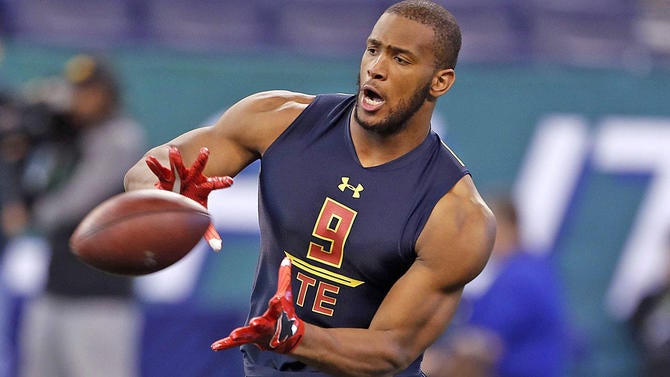
17. Washington Redskins
John Ross, WR, Washington: With DeSean Jackson in Tampa and Terrelle Pryor only signing a one-year deal, Ross makes a lot of sense. He’s only 5-11 and 190 pounds, but what he doesn’t have in height, he makes up for in burst and elusiveness. Ross had 17 receiving touchdowns last season and is also a threat on special teams, averaging 24.4 yards as a kick returner during his career. Oh, and he ran an all-time best 4.22 40-yard dash at the combine.

18. Tennessee Titans
Takkarist McKinley, OLB/DE, UCLA: The Titans bolstered their secondary in free agency (Logan Ryan, Johnathan Cyprien) and with the No. 5 pick (see above). Next up: A dangerous edge rusher. McKinley, an exceptional athlete who is still rough around the edges, managed nine sacks last season.

19. Tampa Bay Buccaneers
Dalvin Cook, RB, Florida State: The Bucs have a glaring need in the backfield and should Cook fall this far, expect them to spring to the podium to submit his name. The dynamic Cook -- who can dazzle as both a runner and a receiver -- could go a long way in making life easier for Jameis Winston.
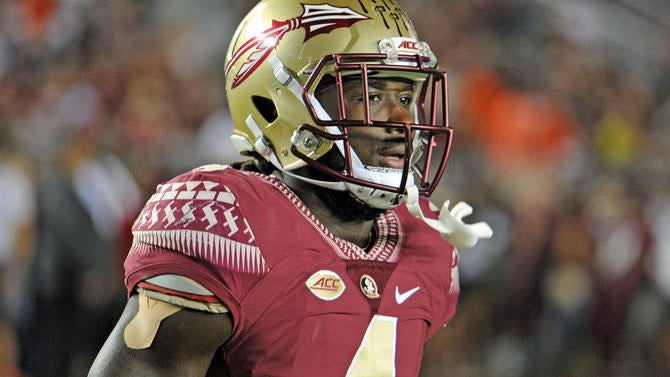
20. Denver Broncos
Ryan Ramczyk, OT, Wisconsin: The Broncos’ offensive line ranked 24th in pass protection and Ramczyk will change that. The task becomes even more important as the Broncos continue their youth movement at quarterback. Last year, it was Trevor Seimian, and in 2017 it could be 2016 first-rounder Paxton Lynch’s time to lead the offense.

21. Detroit Lions
Haason Reddick, LB, Temple: Reddick is a former walk-on who showed up at Temple weighing 185 pounds. He blazed a 4.52 40 at the combine and that, coupled with a dominant 2016 season (9.5 sacks, 22.5 tackles for loss), has NFL teams taking notice.
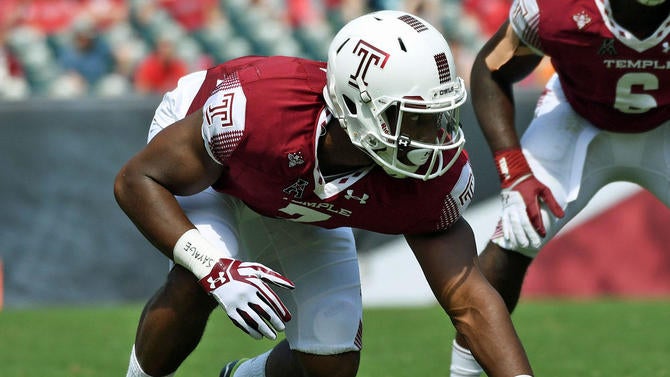
22. Miami Dolphins
Taco Charlton, DE, Michigan: Charlton, who has drawn comparisons to Chandler Jones, racked up 14 sacks the past two seasons, and his ability to get after the passer would fill an obvious void on a Dolphins team that ranked 31st in pass rush a year ago.

23. New York Giants
David Njoku, TE, Miami (Fla.): The Giants had just one skill-position player with a positive grade by the end of last season (surprise of surprises, it was Odell Beckham Jr.), which is a clear sign they need to surround Eli Manning with more play-makers. Brandon Marshall has replaced Victor Cruz, and the expectation is that Sterling Shepard will improve, but an offense can never have enough athletic tight ends.
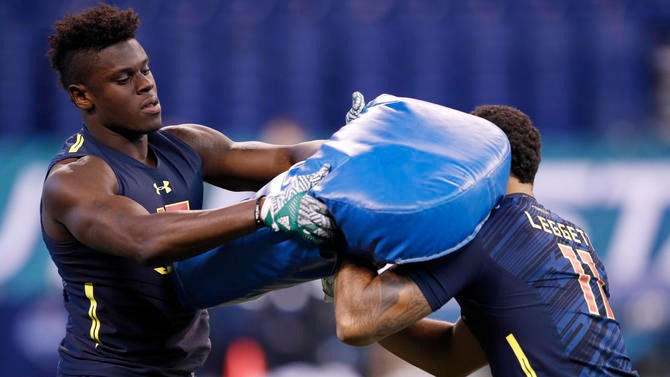
24. Oakland Raiders
Marlon Humphrey, CB, Alabama: The Raiders ranked 25th in pass defense last season and Humphrey is considered one of the most physical cornerbacks in the draft. His father, former Crimson Tide running back Bobby Humphrey, was a first-round supplemental draft pick of the Broncos in 1989.
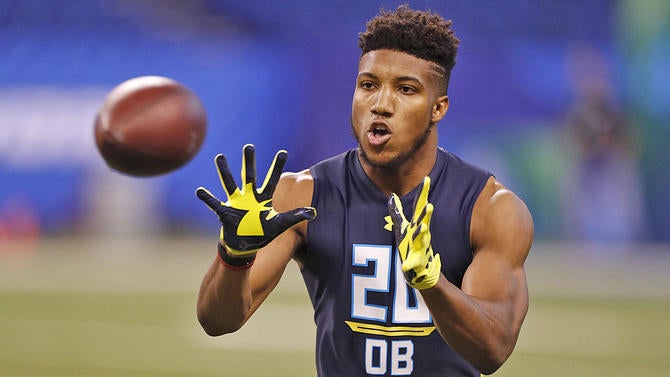
25. Houston Texans
Patrick Mahomes, QB, Texas Tech: The Brock Osweiler era didn’t even last a year, and now the Texans are in a familiar predicament: looking for their next franchise quarterback. Much of the offseason has been about Trubisky, Watson and Kizer, but Mahomes could prove to be the best of the bunch.

26. Seattle Seahawks
Cam Robinson, OL, Alabama: The Seahawks had just one lineman finish with a positive grade last season (Justin Britt). Robinson fills a glaring need, particularly for an offense that struggled to do what it does best: Run the ball.
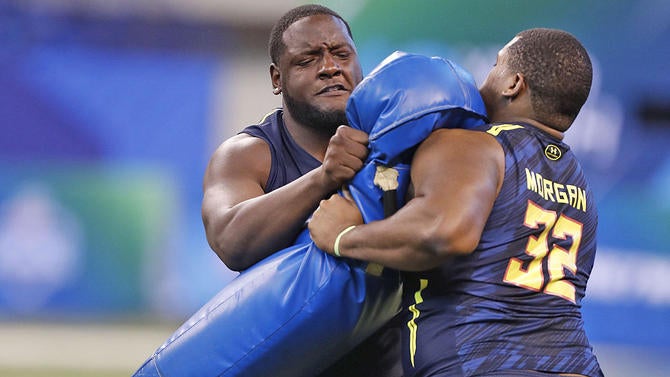
27. Kansas City Chiefs
Malik McDowell, DT, Michigan State: McDowell is a natural athlete whose versatility, at 6-6 and 295 pounds, is a bonus. He won’t replace Dontari Poe, but the Chiefs had just one member of the defensive line with a positive grade last season (Chris Jones) and McDowell has a chance to be truly special. CBSSports.com’s Dane Brugler compares him to Carlos Dunlap.

28. Dallas Cowboys
Carl Lawson, DE, Auburn: For as good as the Cowboys were a season ago -- mostly due to the emergence of Dak Prescott and Ezekiel Elliott -- the defensive was average and the defensive line was only slightly better. Lawson racked up nine sacks and 13.5 tackles for loss last season, and has an explosive first step. He’s also strong as an ox, as evidenced by his combine-best 35 reps of 225 pounds.
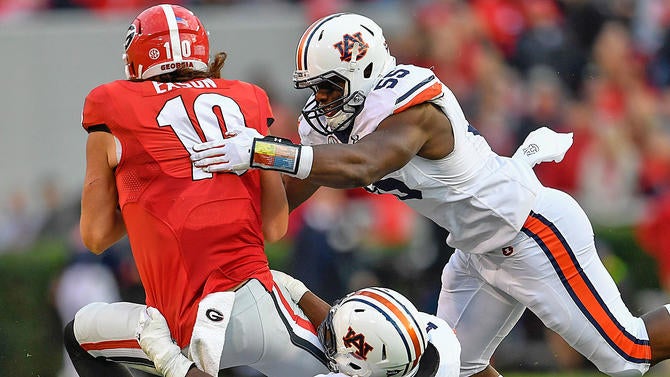
29. Green Bay Packers

T.J. Watt, LB, Wisconsin: With Julius Peppers and Datone Jones gone, the Packers are in the market for pass rushers even after re-signing Nick Perry. And what’s better than having one Clay Matthews? Having two -- Watt (yep, he’s J.J.’s younger brother) has drawn comparisons to Matthews. Measuring 6-5, 243, Watt ran a 4.69 40 at the combine, and finished last season with 11.5 sacks and 15.5 tackles for loss.
30. Pittsburgh Steelers
Budda Baker, S, Washington: The Steelers desperately need a pass rusher but Baker could fill another important need: bolstering the sub-package defense. You remember, the same one that looked like 11 cardboard cut-outs against Tom Brady and the Patriots in the AFC Championship Game. Baker, who had a fantastic pro day, is adept in coverage and also stout against the run. He allows the Steelers to better match up against slot receivers.

31. Atlanta Falcons
Derek Rivers, DE, Youngstown State: After an impressive Senior Bowl week, Rivers’ stock took off at the combine. The Falcons lacked a pass rush for much of 2016 (though you wouldn’t have known it to watch them terrorize Tom Brady for two-plus quarters in the Super Bowl) and Rivers adds that ability to a young defense that got better as the season progressed.
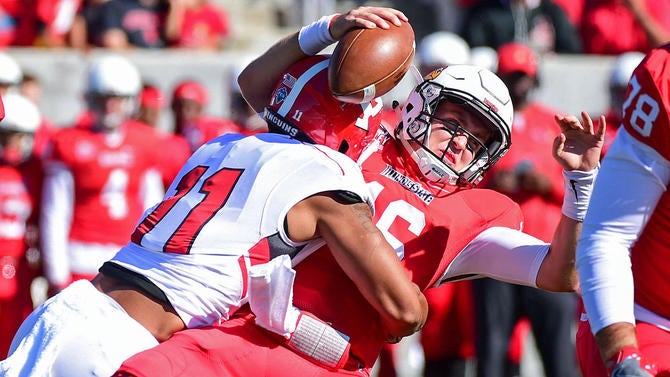
32. New Orleans Saints (from New England)
Christian McCaffrey, RB, Stanford: Brandin Cooks is now in New England and the Saints find their upgrade in McCaffrey, who is dangerous as a runner, receiver and return man.




